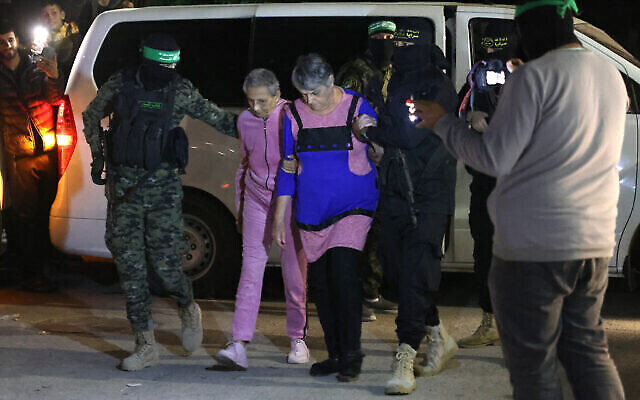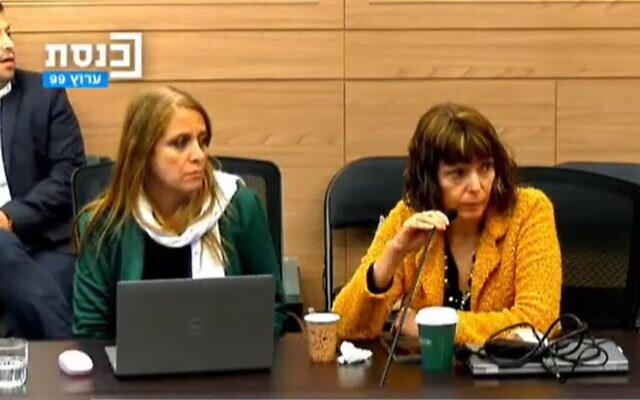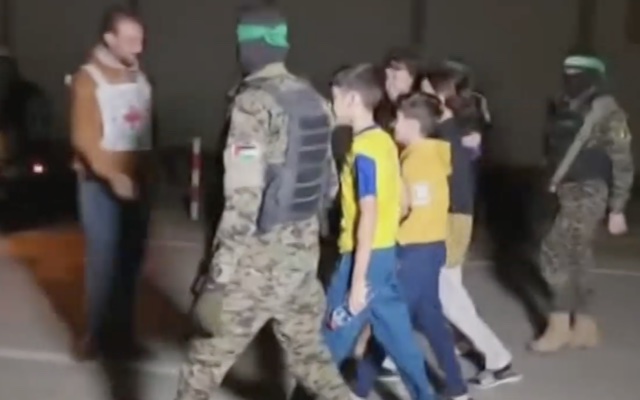Health Ministry says Hamas drugged released hostages to make them appear happy
Knesset committee urges ministry to send international health organisations an official report with evidence of the drugging and other disturbing post-release medical findings.

(THE TIMES OF ISRAEL) At a Knesset Health Committee meeting on Tuesday, a Health Ministry representative said that the hostages recently freed from captivity in Gaza were given tranquilizer pills by Hamas before their release.
The drugging would have been aimed to make the hostages appear calm and happy after suffering physical abuse, deprivation, and psychological terror in Gaza for more than 50 days.
Dr. Hagar Mizrahi, head of the Health Ministry’s medical division, specifically named the drug as Clonazepam. Known as Clonex in Israel and sold under the brand names Klonopin and Rivotril elsewhere, the drug is used to prevent and treat anxiety disorders, seizures, bipolar mania, agitation associated with psychosis, and obsessive-compulsive disorder.
The ministry representative did not disclose whether the drugging had been confirmed by blood tests done on the released hostages at Israeli hospitals, from the freed hostages’ testimony, or both.
Families of hostages speaking earlier to the committee were the first to raise the issue.
Health Committee Chairman MK Yonatan Mashriki (Shas) urged the Health Ministry to send health organizations around the world an official report detailing the evidence of the drugging and other medical findings following the released hostages’ return.
Speaking before the committee, Shir Siegel described some of the horrific experiences of her mother, Aviva Siegel, during her 51 days in captivity. Aviva and Keith Segal were seized by terrorists from their home in Kfar Aza on October 7. Keith, 64, is still a hostage.

Calling the hostages’ situation a “Holocaust three hours from here,” Shir Siegel said she could barely suffer listening to her mother’s accounts of how the terrorists bound and beat her, and denied her food and water.
Her testimony echoed information shared with the public by medical professionals caring for the released hostages in Israeli hospitals. While at first hospital officials told the media that the hostages had come back in “good physical health,” they are now saying that this is not altogether accurate.
Dr. Yael Mozer-Glassberg, director of Israel’s pediatric liver transplantation service at Schneider Children’s Medical Center, told a press conference on Monday that “reports that everyone is giving that the returnees are in more or less stable condition are not true.”
A member of a team of six female physicians, as well as nutritionists, psychologists, and social workers who have attended to the 19 children and seven women brought to Schneider, Mozer-Glassberg reported that the hostages had lost 10-15 percent of their body weight. After having been deprived of food and water, some exhibited disordered eating upon their return.

Mozer-Glassberg said the freed hostages’ heads and bodies were riddled with lice and rashes. The returnees had injuries that had become infected due to a lack of proper care and access to hygiene.
In a television interview aired on Monday, Prof. Itai Pessach, head of the Safra Children’s Hospital at Sheba Medical Center, said more than he had in prior statements about the hostages’ medical condition, letting on that some of them required considerable treatment.
Pessach said the returnees’ stories had shaken him and his colleagues. He likened the situations the hostages lived through in Gaza to the Nazi ghettos and concentration camps of World War II.
Asked what kind of abuse the hostages spoke of having been subjected to, he said only, “They experienced every kind of abuse you can imagine.”
At the Knesset on Tuesday, Health Ministry officials shared a presentation summarizing what they and the hospitals learned from receiving and treating the 105 hostages freed before a truce deal with Hamas collapsed on Friday, and how protocols can be improved for caring for those released in the future.
The ministry officials detailed how the responsibility for care for the first wave of released hostages is now being transferred from hospitals to health maintenance organizations. Individualized plans for each person will be overseen by a nurse coordinating and overseeing their medical and psychosocial care.
Much attention will be put on restoring healthy and nutritious eating habits, as many hostages came back with digestive problems and vitamin deficiencies due to lack of food and sunlight. Achieving this may prove difficult for some hostages who have no home to return to and must live in a hotel or guesthouse.

comments